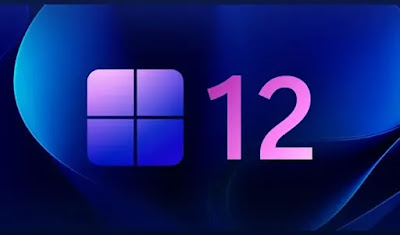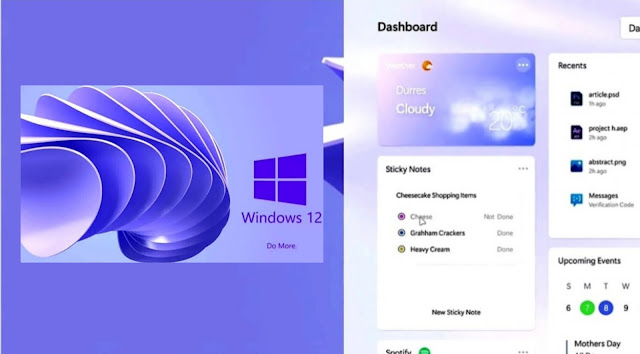Yo, can you believe it? Windows 11 has been around for over two years now, with some updates under its belt. We got Windows 11 version 22H2 in 2022, and a bunch of Moments updates throughout 2023, culminating in the widely available version 23H2. But even though Windows 11 is still fresh with those frequent updates, we're already thinking Windows 12 might drop in 2024.
Microsoft hasn't officially spilled the beans on the new Windows version. In fact, it's like the most underestimated rumor we've heard about Windows 12. Officially, the company's committed to yearly updates and smaller feature updates for Windows 11. But word on the street, and even some hardware homies, suggests Windows 12 might roll out next year. So, what's the lowdown?
When's Windows 12 hitting the scene?
We're calling it – Windows 12 might hit the streets in 2024, marking the third birthday of Windows 11. It's a bit of a throwback to Microsoft's pre-Windows 10 release strategy, so it kinda makes sense from that perspective. That's all we got for now, and it might be a minute before we get more info. If past releases are any indication, Windows 12 might drop in the fall, or at least the second half of the year, but that's not set in stone. Microsoft's denied reports of them working on Windows 12, but since we're still far from launch, they might be playing their cards close to the chest.
Windows 11 desktop with Start menu open and expanded folder showing four apps inside
If you're on the Windows Insider Program, you might catch glimpses of Windows 12 features early, especially on the Canary channel, although it hasn't really happened yet. Most features popping up so far have been in Windows 11, but remember, Windows 11 was a total surprise just a few months before its official launch. We might have to wait a few more months before we get the official scoop.
Is Windows 12 gonna be a free upgrade?
One burning question you might have is whether you'll have to shell out for the upgrade to Windows 12 if and when it drops, but lucky for you, chances are slim. Microsoft's been on the free major Windows update train for a few years now, and it makes sense if they keep it rolling. Of course, Windows 12 itself probably won't be free, so if you don't have a Windows 10 or 11 license at all, you'll still have to cough up.
Some reports hint that Microsoft might introduce a subscription service for Windows 12, but that's not happening. No need to dish out recurring fees to use Windows 12. Of course, you'll still need to buy a license if you're building a custom PC and currently don't have a valid Windows 10 or 11 license, just like the previous releases.
What might make you open your wallet is whether your PC is compatible, but that's a different issue worth discussing.
Am I forced to upgrade?
The most likely answer is no. Microsoft has significantly dialed down its efforts to force users to install a new Windows version forcibly. Windows 11 is still an optional update for Windows 10 users, and most likely, that approach will continue for future releases.
Upgrading to a new Windows version might be mandatory if your current version is approaching the end of its support period. For instance, the original release of Windows 11 will be supported for 24 months if you have the Home or Pro edition, so by now, you should be looking to update to a newer version since those two years have passed.
Windows 11 updates
However, if we look at what happened with Windows 10, Microsoft still provides security updates for the operating system, and you don't have to upgrade to Windows 11. Windows 10 is supported overall until October 2025, and instead of pushing users to Windows 11, Microsoft keeps it on Windows 10 unless they want to upgrade. It's likely that Windows 11 will receive similar treatment after Windows 12 is released, so you won't be forced to upgrade.
Can my PC handle Windows 12?
Since Windows 11 significantly increased the minimum system requirements compared to Windows 10, it's a good question to ponder. Will Windows 12 leave old PCs in the dust again? It's too early to say, but there's a possibility that some PCs might not be compatible for one reason or another. Windows 11 currently requires a processor released around 2018 and onward, and although we don't see any reason for the next Windows release to require more, it's possible.
As for other requirements, again, it's hard to say. Windows 11 needs 4GB of RAM and 64GB of internal storage, so at least Windows 12 might need the same. Don't expect Microsoft to overlook things like TPM requirements either. However, if history is any indication, there will likely be workarounds for unsupported PCs to install it if you're feeling adventurous.
Whatever it is, most of the best laptops you can buy right now will likely support Windows 12 when it drops.
What's new in Windows 12?
It's still too early to know for sure what Windows 12 will bring to the table. However, some reports and leaks have given us a glimpse of what might be part of this major update.
New desktop UI
Although Microsoft hasn't officially announced Windows 12, we recently caught a glimpse of its prototype. Microsoft accidentally showcased a concept for Windows 12 during the Microsoft Ignite keynote hosted by CEO Satya Nadella. The concept showed some interesting changes, including a floating taskbar and several system icons now displayed at the top of the screen, such as Wi-Fi and battery indicators, as well as a weather widget. This would make Windows more akin to macOS or some Linux distributions.
Desktop screenshot of Windows with redesigned toolbar and system icons at the top of the screen
Of course, we're still a few years away from the estimated release date, so this is likely a very early design prototype. It might change significantly or be scrapped altogether before Windows 12 is officially launched, but it gives us some interesting elements to analyze. Windows 11 made significant changes to the taskbar for the first time in years, and if this concept can be implemented, Windows 12 will make even more drastic changes to the usual experience.
Other reported changes include a new lock screen and an optimized login UI for touch devices, and a new notification center that can group notifications based on contacts, not just applications. You're also expected to be able to pin widgets to the desktop rather than using a dedicated widget panel. Other mentioned new capabilities include the ability to create animated wallpapers with parallax effects based on 2D images.
A more modular approach
According to reports, Windows 12 might take a new approach to how the operating system is designed at the core level. Microsoft plans to make Windows 12 more modular, meaning specific OS components can be enabled or disabled for specific devices. This idea, known as CorePC, would allow for a more tailored experience for devices with different form factors and capabilities.
For example, lower-end tablets or foldable PCs might not support classic Win32 applications to have a lighter version. However, those features would still be available on traditional desktop PCs, so old-school users can still use their PCs as usual.
This somewhat resembles what Microsoft attempted with Windows 10X, which was initially designed for dual-screen devices but was eventually scrapped in favor of integrating its features into Windows 10.
Improved integration with Android
With Microsoft's continued push towards cross-platform integration, Windows 12 might bring even tighter integration with Android devices. Features like the Your Phone app might see improvements, and Microsoft might introduce new ways for Windows and Android devices to work seamlessly together. Whether it's enhanced file sharing, better notification synchronization, or improved app integration, expect Microsoft to further bridge the gap between Windows and Android.
Revamped Microsoft Store
Windows 11 saw a significant overhaul of the Microsoft Store, with a more modern design and improved performance. Windows 12 might take it a step further, with more apps available, better curation, and possibly a more open platform. Microsoft has been making strides in allowing third-party payment systems and app stores, so we might see more flexibility in this regard.
Virtual Reality (VR) and Augmented Reality (AR) integration
With the growing interest in virtual and augmented reality, Windows 12 might bring improved support for VR and AR applications. Microsoft has been investing in its mixed reality platform, and the next version of Windows could enhance this aspect further. This might include better support for VR headsets, improved performance, and new features specifically designed for virtual and augmented reality experiences.
Enhancements in gaming
Given the importance of gaming in the Windows ecosystem, Windows 12 might introduce new gaming features and optimizations. This could include improvements in DirectX, better integration with Xbox Game Pass, and possibly new gaming-related features that enhance the overall gaming experience on Windows.
Enhanced security features
Security is always a priority for operating systems, and Windows 12 is likely to introduce new security features and improvements. This might include enhancements to Windows Defender, improvements in biometric authentication, and new tools to protect against emerging threats.
Of course, these are speculative features based on reports and leaks, and the final feature set of Windows 12 may vary. Microsoft tends to keep a tight lid on its plans until it's ready to reveal them officially.
Should I be excited?
Well, that depends on your level of excitement for operating system updates! If you're a tech enthusiast, the prospect of a new Windows version always brings a sense of anticipation. New features, improvements, and a fresh look can make the computing experience more enjoyable.
However, if you're content with your current Windows setup and don't feel the need for major changes, there's no rush to upgrade immediately. Windows 11 will likely receive support and updates for several years even after the release of Windows 12, so you can continue using it without any issues.
Ultimately, whether you should be excited depends on your personal preferences and how much you value the potential enhancements and features that Windows 12 might bring. Keep an eye on official announcements from Microsoft for more concrete information as the release date approaches.



